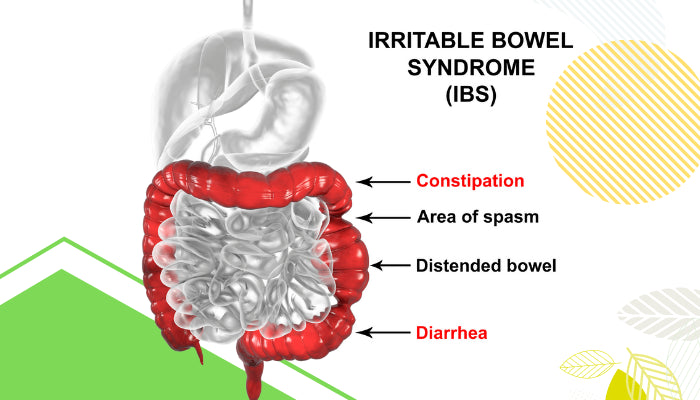Your Cart is Empty

আইবিএস হল একটি সাধারণ হজমজনিত ব্যাধি যা বৃহৎ অন্ত্রকে প্রভাবিত করে এবং ক্র্যাম্পিং, পেটে ব্যথা, ফোলাভাব, গ্যাস, এবং ডায়রিয়া বা কোষ্ঠকাঠিন্য বা উভয়ই ঘটায়। প্রায়শই, আইবিএস-এ আক্রান্ত ব্যক্তিদের কিছু দিন স্বাভাবিক মলত্যাগ হয় এবং অন্য দিনে অস্বাভাবিক হয়।
IBS এর ধরন হল,
IBS এর প্রকৃত কারণ অজানা। তবে কেন কিছু লোকের আইবিএস আছে এবং কিছু লোকের নেই তার জন্য নির্দিষ্ট ব্যাখ্যা রয়েছে।
আইবিএস-এ আক্রান্ত বেশিরভাগ লোকের অন্ত্র এবং মস্তিষ্কের মিথস্ক্রিয়ায় ব্যাধি রয়েছে। এর মানে, তাদের অন্ত্র এবং মস্তিষ্ক প্রায়শই সাবলীলভাবে একসাথে কাজ করতে ব্যর্থ হয়।
এছাড়াও, তাদের সংবেদনশীল পাচনতন্ত্র রয়েছে। অন্ত্রের পেশী সংবেদনশীল এবং অনিয়ন্ত্রিতভাবে সংকুচিত হয়। ফলস্বরূপ, রোগীর তলপেটে ব্যথা, দীর্ঘস্থায়ী ডায়রিয়া বা কোষ্ঠকাঠিন্য অনুভব করে।
IBS অন্ত্রে ব্যাকটেরিয়া বা ভাইরাসের জন্যও বিকাশ করতে পারে। ক্ষতিকারক ব্যাকটেরিয়া যখন অন্ত্রে একটি বড় উপনিবেশ তৈরি করে, তখন তারা এর সংবেদনশীলতাকে প্রভাবিত করতে পারে।
এছাড়াও, প্রাথমিক জীবনের স্ট্রেসযুক্ত লোকেরা তাদের প্রাপ্তবয়স্ক জীবনে আইবিএস অনুভব করতে পারে। স্ট্রেস আইবিএস-এ আক্রান্ত ব্যক্তিদের পরিস্থিতি আরও খারাপ করে।
কখনও কখনও জেনেটিক্স একটি ভূমিকা পালন করে। IBS এর পারিবারিক ইতিহাস থাকা ব্যক্তিরা তাদের জীবনে এই অবস্থার সম্মুখীন হতে পারেন। 50 বছরের কম বয়সী যুবক এবং মহিলাদের আইবিএস হওয়ার সম্ভাবনা বেশি।
আইবিএস উপসর্গ ব্যক্তি ভেদে ভিন্ন হতে পারে। কখনও কখনও, একজন ব্যক্তি বিভিন্ন উপসর্গও অনুভব করতে পারেন। তাই আপনি বিভিন্ন অস্বাভাবিক মলত্যাগ এবং অস্বস্তি অনুভব করতে পারেন। যাইহোক, এখানে IBS এর কিছু সাধারণ লক্ষণ রয়েছে-
আপনি সম্পূর্ণরূপে ইরিটেবল বাওয়েল সিনড্রোম নিরাময় করতে পারবেন না। যাইহোক, এমন কিছু চিকিত্সা রয়েছে যা আপনাকে আপনার লক্ষণগুলি নিয়ন্ত্রণ করতে সাহায্য করবে। এবং অনেক লোক কিছু সময়ের জন্য উপসর্গগুলি বন্ধ করতে বা আরও ভাল জীবনযাপনের জন্য এটি হ্রাস করতে পেরেছে।
আইবিএস-এর চিকিৎসার জন্য, আপনাকে খাদ্যতালিকাগত পরিবর্তন করতে হবে এবং আপনাকে সবচেয়ে বেশি কী প্রভাবিত করে তার ট্র্যাক রাখতে হবে। তাছাড়া, আপনি পুষ্টিকর সম্পূরক গ্রহণ করতে পারেন এবং ওষুধগুলি লিখে দিতে পারেন যা আপনাকে সাহায্য করবে। উপরন্তু, নিয়মিত শারীরিক ক্রিয়াকলাপ এবং ব্যায়াম, স্ট্রেস পরিচালনা এবং নিজেকে শান্ত রাখাও আইবিএস চিকিত্সার একটি অংশ হতে পারে।
আইবিএস-এর উপসর্গ কমাতে কিছু খাবার হল,
চর্বিহীন প্রোটিন: চর্বিহীন প্রোটিন সহজে হজম হয়। কিছু চর্বিহীন প্রোটিন হল ডিম, মাছ, সাদা মাংসের মুরগি, সাদা মাংস টার্কি, গরুর মাংসের চর্বিহীন কাটা ইত্যাদি।
চর্বিযুক্ত মাছ : স্যামন, কডের মতো চর্বিযুক্ত মাছে ওমেগা -3 ফ্যাটি অ্যাসিড বেশি থাকে যার শক্তিশালী অ্যান্টি-ইনফ্ল্যামেটরি প্রভাব রয়েছে। যেহেতু অন্ত্রের প্রদাহ আইবিএস লক্ষণগুলিতে অবদান রাখে বলে জানা যায়, বেশি ওমেগা -3 সমৃদ্ধ মাছ খাওয়া সাহায্য করতে পারে।
শাকসবজি: শাকসবজি যেমন বেল মরিচ, গাজর, ভুট্টা, বেগুন, মৌরি, সবুজ মটরশুটি, পার্সলে, মিষ্টি আলু, টমেটো, পালং শাক, লেটুস ইত্যাদি আপনার অন্ত্রের উদ্ভিদের (ব্যাকটেরিয়া এবং খামির যা হজমে সাহায্য করে) এবং আপনার সামগ্রিক অন্ত্রের জন্য খুব ভাল স্বাস্থ্য আপনি যদি সবজি হজম করা কঠিন মনে করেন তবে ধীরে ধীরে শুরু করুন।
ফল: অ্যাভোকাডো, কলা, ব্লুবেরি, কিউই, পেঁপে, রাস্পবেরি, স্ট্রবেরি ইত্যাদির মতো ফলগুলিতে এমন কিছু পুষ্টি রয়েছে যা আপনার অন্ত্রের উদ্ভিদের জন্য ভাল যা আইবিএস রোগীদের জন্য সহজ করে তোলে।
বাদাম: বাদাম যেমন বাদাম, ব্রাজিল বাদাম, হ্যাজেলনাট, ম্যাকাডামিয়া বাদাম, পেকান, পাইন বাদাম এবং আখরোট ফাইবার, প্রোটিন এবং ওমেগা -3 ফ্যাটি অ্যাসিডের একটি ভাল উৎস। অন্ত্রের প্রদাহ বাড়াতে পারে এমন স্যাচুরেটেড বা ট্রান্সফ্যাট এড়াতে, ভুনা, স্বাদযুক্ত, মসলাযুক্ত বা মিষ্টির পরিবর্তে কাঁচা বাদাম খান।
বীজ : চিয়া বীজ, জিরা বীজ, মৌরি বীজ, ফ্ল্যাক্সসিড, কুমড়ার বীজ এবং সূর্যমুখী বীজের মতো বীজগুলি ফাইবারের বড় উত্স এবং কোষ্ঠকাঠিন্য-প্রধান (IBS-C) রোগীদের উপকার করতে পারে। এগুলি পুষ্টির দিক থেকেও ঘন এবং অ্যান্টিঅক্সিডেন্ট, ওমেগা-৩ ফ্যাটি অ্যাসিড এবং খনিজ পদার্থে ভরপুর
গাঁজনযুক্ত খাবার : দই একটি গাঁজনযুক্ত খাবার যা প্রোবায়োটিকের অনেক প্রাকৃতিক স্ট্রেন ধারণ করে। প্রোবায়োটিক হ'ল উপকারী ব্যাকটেরিয়া এবং ইস্ট যা অন্ত্রের উদ্ভিদকে স্বাভাবিক করতে এবং হজমে সহায়তা করে। আপনার সক্রিয় IBS-D থাকলে প্রোবায়োটিকগুলিও কার্যকর কারণ তারা ডায়রিয়ার মাধ্যমে হারিয়ে যাওয়া স্বাস্থ্যকর ব্যাকটেরিয়া পুনরুদ্ধার করতে পারে।
হলুদ : হলুদের জৈব সক্রিয় উপাদান- কারকিউমিন হেলিকোব্যাক্টর পাইলোরি কার্যকলাপকে বাধা দেয় এবং অন্ত্রের কার্যকারিতা এবং মস্তিষ্কের (অন্ত্র-মস্তিষ্কের অক্ষ) মধ্যে যোগাযোগ উন্নত করে। এই হলুদের ডেরিভেটিভ স্থানীয় মাইক্রো-ভাস্কুলার ভাসোডিলেশন এবং অঙ্গের রক্ত প্রবাহ বৃদ্ধি, গ্যাস্ট্রো সুরক্ষা এবং আলসার নিরাময়কে সহায়তা করে।
গবেষকরা আরও দেখেছেন যে কারকিউমিন আইবিএস এবং অন্যান্য অসুস্থতার জন্য ব্যবহার করা যেতে পারে, যেমন কোষ্ঠকাঠিন্য, পেটে ব্যথা, ফোলাভাব।
তুঁত: তুঁতে পলিফেনল রয়েছে, গবেষণায় ইঙ্গিত দেওয়া হয়েছে যে পলিফেনলগুলি অন্ত্রে বসবাসকারী ক্ষতিকারক অন্ত্রের ব্যাকটেরিয়াগুলির বিরুদ্ধে অ্যান্টিমাইক্রোবিয়াল কার্যকলাপ বা প্রিবায়োটিক-সদৃশ ক্রিয়া নিযুক্ত করে অন্ত্রের মাইক্রোবায়োটা (GM) এর বাস্তুসংস্থান পরিবর্তন করতে পারে। পলিফেনল লাভজনক প্রজাতির জনসংখ্যা বৃদ্ধি করে যেমন বিফিডোব্যাকটেরিয়াম এবং ল্যাকটোব্যাসিলাস, যা অন্ত্রের বাধা রক্ষায় অবদান রাখে। উপরন্তু, তারা faecalibacterium prausnitzil এর বিষয়বস্তু বাড়াতে পারে, যা একটি অ্যান্টি-ইনফ্ল্যামেটরি প্রভাব দ্বারা চিহ্নিত করা হয় ।
ওষুধ : আইবিএসের চিকিৎসার জন্য বেশ কিছু ওষুধ ব্যবহার করা যেতে পারে। যেমন,
আকুপাংচার উদ্বেগ, ফাইব্রোমায়ালজিয়া, মাইগ্রেন এবং IBS এর সাথে সম্পর্কিত অনিদ্রা পরিচালনায় সহায়ক হতে পারে। জিআই গতিশীলতা এবং ব্যথা উপলব্ধি পরিবর্তন করে আকুপাংচার সরাসরি গ্যাস্ট্রোইনটেস্টাইনাল প্রভাব ফেলতে পারে।
থেরাপিউটিক ম্যাসেজ উদ্বেগ কমাতে এবং চাপ উপশম করতে সাহায্য করতে পারে।
সাইকোথেরাপি: স্নায়ুতন্ত্র এবং কোলনিক ফাংশনের মধ্যে একটি শক্তিশালী সংযোগ রয়েছে। আইবিএস রোগীদের লক্ষণগুলির ফ্রিকোয়েন্সি এবং তীব্রতায় স্ট্রেস একটি গুরুত্বপূর্ণ ভূমিকা পালন করে। চাপযুক্ত জীবনের ইতিহাস, প্রিয়জন হারানো, বিষণ্নতা আইবিএসের লক্ষণগুলিকে বাড়িয়ে তুলতে পারে। কখনও কখনও উদ্বেগ বা হতাশা আইবিএস লক্ষণগুলির সূত্রপাতের সাথে দেখা দেয়। সাইকোথেরাপি স্ট্রেস কমাতে সাহায্য করতে পারে তাই আইবিএস সমস্যা কমিয়ে আনতে পারে।
এখানে কিছু খাবার রয়েছে যা আপনাকে আইবিএস লক্ষণগুলি বজায় রাখতে এড়িয়ে চলতে হবে-
আপনি যদি আইবিএস পরিচালনা করেন তবে একটি নির্দিষ্ট জীবনধারা বজায় রেখে এটি সম্ভব। আপনার পাচনতন্ত্রকে সমর্থন করার জন্য আপনি কার্কুমা জৈব স্বাস্থ্যকর অন্ত্রও নিতে পারেন। এই কার্যকরী খাবারে রয়েছে জৈব কারকিউমিন এবং তুঁত যা আপনার অন্ত্রে পুষ্টি জোগাতে এবং ভালো ব্যাকটেরিয়া উপনিবেশ উন্নত করতে সাহায্য করতে পারে যেমনটি আমরা আগে আলোচনা করেছি। এটা আমাদের ওয়েবসাইটে উপলব্ধ!
উত্তর: দুঃখজনকভাবে, IBS সম্পূর্ণরূপে চিকিত্সা করা যায় না। যাইহোক, আপনি আপনার জীবনধারা এবং খাদ্যাভ্যাস পরিবর্তন করে কিছু উপসর্গ কমাতে পারেন। এছাড়াও, আপনি আপনার ডাক্তারের সাথে পরামর্শ করে IBS বজায় রাখার জন্য একটি কৌশল তৈরি করতে পারেন।
উত্তর: আপনি আপনার IBS পরিচালনা করার জন্য কিছু পদক্ষেপ চেষ্টা করতে পারেন। এর মধ্যে রয়েছে শিথিলকরণের ব্যায়াম, আইবিএস ট্রিগারকারী খাবার এড়িয়ে চলা, প্রিবায়োটিক এবং প্রোবায়োটিক খাওয়া এবং শারীরিক ক্রিয়াকলাপ অনুশীলন করা।
উত্তর: মহিলাদের মধ্যে আইবিএস-এর লক্ষণগুলির মধ্যে রয়েছে পেশী ক্র্যাম্পিং, ফোলাভাব, ডায়রিয়া, পেটে ব্যথা এবং কোষ্ঠকাঠিন্য। তারা তাদের মাসিকের সময় ক্লান্তি, পিঠে ব্যথা এবং অনিদ্রা অনুভব করতে পারে।
এটি পরবর্তী পড়ুন: লিভার রোগের প্রধান কারণ কী? প্রতিরোধ এবং চিকিত্সা
মন্তব্য দেখানোর আগে অনুমোদিত হবে.